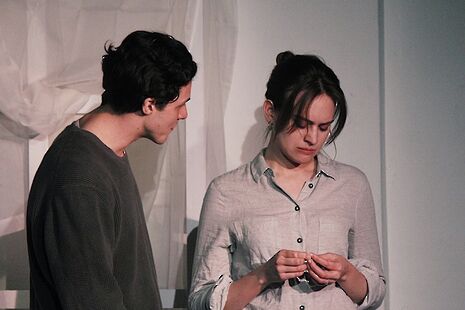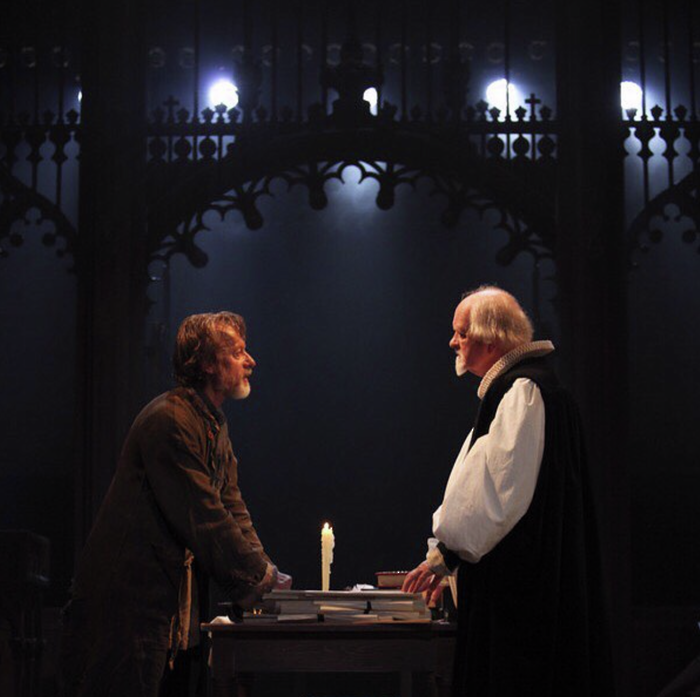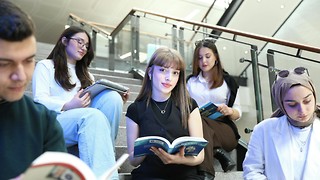Yerma review
A ‘thoughtfully executed,’ ‘wonderfully creative’ and ‘perfectly-pitched production’

Federico Garcia Lorca’s 1934 play ‘Yerma’ is set half in the house of the young couple, Yerma and Juan, and half in the fields that surround their house in the Spanish countryside. The Corpus playroom presents both of these scenes simultaneously, hung with long windows and lined at floor level with reeds, displaying a doubleness of set which layers the two locations on top of one another and allows for smooth transition between them.
“The dynamism of these female characters contrasts with the stillness of the men”
Amara Heyland-Morrin’s vision carries a clear sense of place – not of specific place, but more the feeling of a society, one separated from any wider world, where values are fixed and all-engulfing. Here women marry and give birth, and this is what matters. We take Yerma’s desire for granted as we watch this play, and we feel with her that it is the most important thing: we don’t even question the problems of a society which promotes such a problematic vision of femininity. This play, as it is presented here in Morrin’s directorial vision, does not push against society’s values, but works within them. Yerma’s name means ‘barren’ in Spanish, and thus from the start she is defined in terms of her inability to have children.
The play opens (and closes) with a dance. These framing sequences, performed against the backdrop of a projection of waves, epitomise the symbolic choreography that is so central to this production. This production drips with symbolism, and each of these moments are wonderfully crafted so as to be at once beautiful and grotesque – and backed by live piano and violin music by Sam Tannenbaum and Esme Cavendish. The white sheets (possibly the production’s most important prop) enact this endless symbolism as they first become a noose in a silent strangling scene (as well as in a loud one at the end), and then create a moving surface which drowns Yerma, and against whose tautness her movement begins to look like the kicking of a baby inside a mother; in the gossiping scene with all of the women they begin as the floaty freedom of laying washing out to dry in the open air but soon become tainted with the dark cruelty of these women’s words. The skipping rope made out of these same sheets is not an image of liberating childishness, but one of the nastiness of children excluding others in the playground: it becomes so horrible we can’t even look.
The most eerie moment may come when these women act as a group, but individuals shone in their scenes too. Bathsheba Lockwood Brook, playing the wise old woman who calls Yerma child and tells her to feel the wind through her skirt, squeezes the truth out of Yerma not just through her words but also through her ownership of the space: he moves closer with each prying question she asks or suggestive detail she extracts from Yerma. Vee Tames as Maria shows a wonderful development in her role, beginning as the young, naïve and worried expecting mother to the woman with two children who is not afraid to voice the difficult effects of Yerma’s envy. She overtakes Yerma; she makes us feel the pain of Yerma’s lack.
Annabelle Haworth as Yerma relishes in the detail of her smaller movements, particularly in the later scenes. Her eyes flit skittishly, and her hands shake: her whole body takes part in the feelings. Part of the power of her symbolism lies in the way she is dressed, but Haworth makes sure that she complements and fills her costume, rather than letting herself be defined by it. She begins in a white dress, when the illusion of her happiness is more solid, but after the women gossip and call her barren, she reappears in grey linen, with her hair scraped back. I cannot praise enough the artistic vision both of Hemma Jari and directors Heyland-Morrin and Teodorescu for the way these costumes shape how the audience views the characters. They unleash a power of costume so often overlooked in student theatre.
The dynamism of these female characters contrasts with the stillness of the men. Gabriel Wheble as Juan does everything with the tightness of a man constrained by honour, one who ‘just gets the job done without paying a single attention to the details’: a man who eats an apple without calling it delicious. Harry Burke as Victor is conscious of the boundaries which he cannot transgress, and there is a feeling throughout of his pent-up passion which never quite shows through. In this production, the men have been interpreted as merely representations, rather than individualised characters: and I must admit that I’m not sure about this way of playing the male characters. While I could convince myself that their stiffness was deliberate, I felt at moments that the men seemed uncomfortable and mechanical on stage: and it was a shame to feel this about Burke and Wheble’s acting. If they are going to follow this interpretation, perhaps they should be even more deliberate, so that the audience can be in no doubt that this is what they mean to do.
The biggest tragedy of Lorca’s play is the particularity of Yerma’s desire. All she wants is a child, and everything else she wants is merely to reach this end point. Heyland-Morrin and Teodorescu’s production, set aside from reality in the brightness of the countryside, the river and the isolated house, follows through this sense of the only thing that matters: the female body and its desire to grow. The female actors, complemented by the men, do just this as they act, emphasising the power and the importance of their womanly bodies, but in the end, too, their failure. These women will wither like roses. This production of ‘Yerma’ is thoughtfully and beautifully executed, and the new touches which this team have given it are wonderfully creative and perfectly-pitched. ‘Yerma’ completely deserves the sell-out audience it got on its opening night.
 News / Local business in trademark battle with Uni over use of ‘Cambridge’17 January 2026
News / Local business in trademark battle with Uni over use of ‘Cambridge’17 January 2026 News / Cambridge bus strikes continue into new year16 January 2026
News / Cambridge bus strikes continue into new year16 January 2026 Comment / Fine, you’re more stressed than I am – you win?18 January 2026
Comment / Fine, you’re more stressed than I am – you win?18 January 2026 News / News in Brief: cosmic connections, celebrity chefs, and ice-cold competition18 January 2026
News / News in Brief: cosmic connections, celebrity chefs, and ice-cold competition18 January 2026 Film & TV / Anticipating Christopher Nolan’s The Odyssey17 January 2026
Film & TV / Anticipating Christopher Nolan’s The Odyssey17 January 2026










